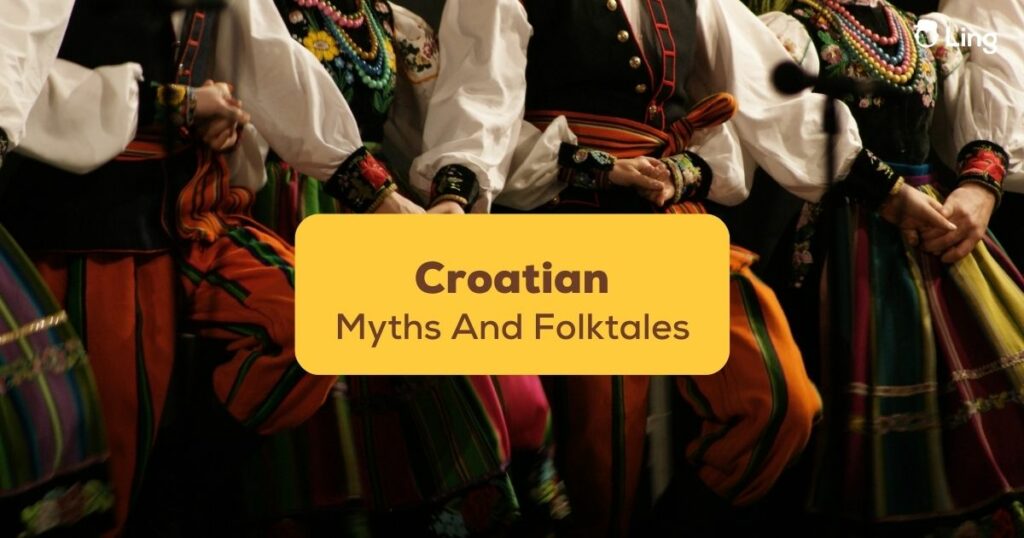A surefire way to deeper appreciate a country’s language, tradition, and culture is through its myths and folktales. Croatian myths and folktales have a rich Slavic mythology, but there are also a wealth of Croatian myths and folk tales told in the many Croatian languages that belong to this eastern Europe republic.
In this blog, we will look at a few of the many myths and most famous legends and folk beliefs. Ready to learn Croatian with these stories? Let’s get started!
The Legend And Curse Of King Zvonimir
King Zvonimir ruled Croatia in the 11th century, a time in the history of relative peace and prosperity. Legend tells of the king being asked by the Byzantine ruler and the Pope to rally his people and lead them on a campaign in the name of Christ.
Zvonimir agreed, but when his people realized they were being gathered to fight in a foreign war it was a disaster and they revolted against their king and violently rose against him.
A Curse On The People
Although the circumstances of his death in 1089 are shrouded in mystery, it is said that as he lay dying Zvonimir cursed his country and the Croatian people declaring that for the next 1000 years, his country would not be ruled as an independent kingdom by a native leader.
What followed were centuries of anarchy until Croatia was united with Hungary, so the curse uttered in ancient times appears to have been effective.
The Legend Of Mila Gojsalić
It is the 16th century, and the Ottoman Turks are on the cusp of capturing the Republic of Poljica. Ahmed Pasha is preparing to lead his army and deliver his coup de grâce. According to Croatian mythology and history, the gorgeous Mila Gojsalić walked into the invaders’ camp and Ahmed Pasha was so stricken by her beauty that he put off his attack to spend the night with her.
Ottoman Turks Defeated
After he had fallen asleep, Mila snuck out of his tent and made her way to the army’s store of gunpowder. She took a flaming torch to the supplies. The massive explosion killed Ahmed Pasha and a large number of his soldiers.
With the Ottomans in disarray, the Croatian forces were able to beat them back.
In recognition of Mila’s sacrifice, a statue has been erected on a mountaintop outside the town of Omiš where the courageous young woman keeps watch over her people and continues to bring luck.
The Legend Of The Rooster
Another legend that purports to be based on real historical events according to Croatian folklore is the rooster of Đurđevac. It is the 16th century, and Ulma-beg is leading his Turkish army against the heavily fortified town of Đurđevac. What was supposed to be an easy victory for the Turks turned into a drawn-out siege. In an attempt to force the townspeople to surrender, the Turkish army cut off their food supplies.
Eventually, the only food left in Đurđevac was one skinny chicken. But instead of putting it in the pot, a wise old woman suggested the rooster be put in a cannon and fired at the enemy. The commander of the Đurđevac forces somewhat surprisingly agreed and launched the cockerel at the Turks.

A Wise Old Woman Saves The Day
Ulma-beg was understandably baffled by the attack and assumed that if they were firing roosters at him the townspeople must have far more food at their disposal than he had imagined. Dismayed, he called an end to the siege and packed up his camp.
Before leaving, Ulma-beg shouted a curse at the townspeople calling them picoki (roosters). Rather than taking this as an insult, the people of Đurđevac continue to wear the nickname with pride. Today the event is celebrated annually with the Picokijada festival.
The Legend Of The Giant And The Cave Of Pazin
Ban Dragonja was a kind-hearted Croatian giant who, a long time ago, according to Croatian mythology was the size of a mountain. Happy to help the humans, Ban Dragonja agreed to plow the earth to create rivers that could be used to irrigate the crops and bring life to the valley. According to the fairy tale and Croatian culture, the first river he created he named Dragonja, and the second he dedicated to his wife Mirna.
The third furrow he created was more difficult than the first two and ran close to the walls of the city. The Croatian myth states that unimpressed by his efforts, his wife Mirna began to berate her well-meaning husband. Despondent, Ban Dragonja abandoned his task.

A Kind-Hearted Giant
However, the furrow was being fed by a river and quickly began to fill with water. The terrified townspeople realized that if nothing were done the whole valley would soon be flooded. They begged Ban Dragonja to help them. Taking pity on the Croatian people, the friendly giant returned and stamped his foot down close to the city walls opening up a vast cavern that swallowed the water. The giant’s actions saved the souls of the city and today, those visiting Pazin can marvel at the Pazin cave which continues to drain waters from the valley.
The Legend Of Nera And Antonio
This well-known Croatian myth and one of the most popular Croatian tales from a time when mystical creatures and fairies roamed the earth and people believed in the god’s features Antonio, an extremely beautiful human, and Nera the goddess of the sea. Antonio was a simple living, hard-working man who was adored by every woman who gazed upon him.
However, he was not interested and preferred to concentrate on his work till the earth. One day, as he was bathing in the sea, Nera saw Antonio and immediately fell in love with him. Nera’s feelings were reciprocated and the two became inseparable.
Angering The Gods
Unfortunately, bad luck meant Nera was already betrothed to the supreme god of the sea. Her love for Antonio was so strong that she offered to give up her immortality to be with him. However, her father refused her request adding that if she stayed with Antonio he would turn both of them to stone.
Nera decided not to risk her lover’s life or anger the Croatian gods by choosing to return to her watery world. Although Nera and Antonio never saw each other again, Antonio lived into old age and their love was everlasting.

Learn More Croatian With The Ling App
If you would like to delve deeper into the rich history of Croatian folklore and Croatian folk tales and Croatian mythology, why not improve your knowledge of the Croatian language and its idioms by downloading the Ling app? Ling makes learning any language fun and easy with various lessons, games, and quizzes. The Ling App is available at both the App Store and Google Play.



































































